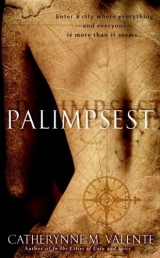
Текст книги "Palimpsest"
Автор книги: Catherynne M. Valente
Жанр:
Классическое фэнтези
сообщить о нарушении
Текущая страница: 10 (всего у книги 19 страниц)
Quiescence and Rapine
PALIMPSEST POSSESSES TWO CHURCHES.They are identical in every way. They stand together, wrapping the street corner like a hinge. Seven white columns each, wound around with black characters that are not Cyrillic, but to the idle glance might seem so. Two peaked roofs of red lacquer and two stone horses with the heads of fork-tongued lizards stand guard on either side of each door. The ancient faithful built them with stones from the same quarry on the far eastern border of the city, pale green and dusty, each round and perfect as a ball. There is more mortar in the edifices than stones, mortar crushed from Casimira dragonflies donated by the vat, tufa dust, and mackerel tails. The pews are scrubbed and polished with lime oil, and each Thursday, parishioners share a communion of slivers of whale meat and cinnamon wine. The only difference between the two is in the basement—two great mausoleums with alabaster coffins lining the walls, calligraphed with infinite care and delicacy in the blood of the departed beloved contained within. In the far north corners are raised platforms covered in offerings of cornskin, chocolate, tobacco.
In one church, the coffin contains a blind man. In the other, it contains a deaf woman. Both have narwhal’s horns extending from their foreheads; both died young. The modern faithful visit these basement-saints and leave what they can at the feet of the one they love best.
Giustizia has been a devotee of the Unhearing since she was a girl—her yellow veil and turquoise-ringed thumbs are familiar to all in the Left-Hand Church; she brings the cornskins, regular as sunrise. When she dies, they will bury her here, in a coffin of her own.
She will plug your ears with wax when you enter and demand silence with a grand sweep of her forefinger. You may notice the long rattlesnake tail peeking from under her skirt and clattering on the mosaic floor, but it is not polite to mention it—when she says silence, you listen. It is the worst word she knows.
_______
Ludovico chooses the Left-Hand Church. He cannot say why. It does not seem like much of a choice, but he makes it, with determination. If there is anything a Roman man knows, it is how to associate with a church, how to choose one in a city of churches and become loyal to it, to know its clerestory and its finials like the breasts of a wife. To predict the exact tone into which it will weave your voice with all its heights and rafters and soaring galleries.
The congregation is silent, though the pews are crowded with parishoners. Ludovico treads softly on the aisle, which is covered in chrysanthemums planted deep in the soil of the church’s most secret parts. Far above, ravens line the clerestory, and between them some few folk with long black wings, dangling their feet in the air. He stares at them in horror and enthrallment: there are no humans here. Each of the faithful is in part another thing: men with the heads of great serpents, women with shells like tortoises upon their backs. Children with long, hairy orangutan arms fidget and bent, scolding crones’ legs end in elephantine feet, or cheetah feet, or musk-ox soles, warted and blackened. A man with a giraffe neck grafted to his shoulders sits politely in the rear row, so as not to block anyone’s view. Not a few have fins protruding painfully from their backs which their aunts and uncles keep solicitously wet with the help of small and sacred cups.
At the altar, a priest with the head of an ancient, worried lion holds out her arms in mute supplication, her mouth gaping, her feline face red with the effort of her silence, tears streaming through her whiskers. A few worshippers are crying, too, and nodding as though she spoke. A little girl in the front row holds out her long, mottled arms to the priest, an octopus’s tentacles, their suckers opening and closing in mute pleas. The child opens her mouth and wails as children will do when they are grieved, but only a throttled gurgling emerges. Her parents gather her in and she buries her face in their scaly breasts.
Ludovico sinks to his knees in the flowers, overcome. Why should he care for these wretched animals? Perhaps because they are in church? He trembles—this is not like the Troposphere with its pounding mechanical horses. It is so quiet here.
Here begins the book of the nature of beasts,Ludo thinks. All the best bestiaries begin that way. If I were to write of this place, I could make a book longer than Isidore’s, greater than theEtymologiae. Here there are creatures beyond any Spaniard’s fever-dream and more, they arereal. I have seen them. I will be able to write truly that I knelt among them, I prayed with them and saw them weep as though they were possessed of souls. No Pope will ever believe me, or beatify me, or sanctify my encyclopedia, but I will know it was true.
The silence lays hands on him and Ludovico is moved beyond himself. For this church of invalids he will bear mouse-women and eel-women and anything else. He will bear Lucia’s abandonment, for this is the land of St. Isidore. Bee-crowned Isidore, who wrote the great compendium of wisdom and Christian magic, human behavior and the names of monsters that medievalists still pore over with glee—he must have seen this place. He only reported what he saw. Ludo’s hands fly to his St. Isidore’s medal. The vision of the octopus-child compels him to his knees. In his life, Ludovico has never loved a thing that did not destroy him, and he goes gladly to this third thing in his small catalogue of loves which before now was comprised of a book and a woman alone.
He stretches out his arms, his skinny, human arms to the lion-priest and calls out to her, his voice ghastly in the echoing cathedral, a thing made for shattering.
“Ave Maria, gratia plena!”he cries. It is all he knows how to say, the most sacred thing. “Dominus tecum, benedicta tu in mulieribus, et benedictus fructus ventris tui!”
He is laughing and weeping, and all stare at him. The octopus-girl pulls away from her parents as he begins again:
“Ave Maria!”
She walks toward him like a little bride, serious in her white dress, hair the color of a bruise hanging in two long, straight planks to her knees. Her pace is slow and she does not try to run—Ludo is sure she has been told not to run in church. She puts her cold, wet tentacles around his neck; they coil heavily on his shoulders. She fixes him with a solemn expression. Slowly, she kisses his cheek.
“Ave Maria!”he sobs, and the congregation, as if released by the child’s gestures, descends upon him, straining to put their paws and their hands on him, their fur and their slime.
“Ave! Ave! Ave!”he howls, and the ravens recoil, wheeling in the rarified air of the upper balconies, screaming in alarm and ecstasy.
A hundred hands and more cover his mouth, gently, like aunts tasked with the care of an unruly boy. He bellows grief into their embraces, and the Left-Hand Church is filled with the sound of him as he is rocked in the arms of the wretched and the plagued, rocked until he is quiet, and can bear their kind eyes and their grotesque kisses.
PART III:
THE PRINCESS OF PARALLELOGRAMS
In Transit, Westbound: 8:17
SIX EXPRESS TRACKSand twelve locals pass through Palimpsest. The six Greater Lines are: Stylus, Sgraffito, Decretal, Foolscap, Bookhand, and Missal. Collectively, in the prayers of those gathered prostrate in the brass turnstiles of its hidden, voluptuous shrines, these are referred to as the Marginalia Line. They do not run on time: rather, the commuters of Palimpsest have learned their habits, the times of day and night when they prefer to eat and drink, their mating seasons, their gathering places. In days of old, great safaris were held to catch the great trains in their inexorable passage from place to place, and women grappled with them with hooks and tridents in order to arrive punctually at a desk in the depths of the city.
As if to impress a distracted parent on their birthday, the folk of Palimpsest built great edifices where the trains liked to congregate to drink oil from the earth and exchange gossip. They laid black track along the carriages’ migratory patterns. Trains are creatures of routine, though they are also peevish and curmudgeonly. Thus the transit system of Palimpsest was raised up around the huffing behemoths that traversed its heart, and the trains have not yet expressed displeasure.
To ride them is still an exercise in hunterly passion and exactitude, for they are unpredictable, and must be observed for many weeks before patterns can be discerned. The sport of commuting is attempted by only the bravest and the wildest of Palimpsest. Many have achieved such a level of aptitude that they are able to catch a train more mornings than they do not.
The wise arrive early with a neat coil of hooked rope at their waist, so that if a train is in a very great hurry, they may catch it still, and ride behind on the pauper’s terrace with the rest of those who were not favored, or fast enough, or precise in their calculations. Woe betide them in the infrequent mating seasons! No train may be asked to make its regular stops when she is in heat! A man was once caught on board when an express caught the scent of a local. The poor banker was released to a platform only eight months later, when the two white leviathans had relinquished each other with regret and tears.
A great number of commuters witnessed the girl with blue hair and her now-famous leap into the waiting doors of the Marginalia. Their coats flapped in the hot wind of the station-bowels. Their lips went suddenly dry; their pulses quickened as one stream of blood through one heart. A few smiled, and all noted in their observances that a woman was taken from the platform on this date, at that time. It is important to know these things. They have happened before. Rarer than mating season is this one, and they must know when it begins and when it ends, in order to compare notes with their fellow enthusiasts so that they may predict when the contents of their prayers must change, and when they will shift to the Secondary Prime Schedule, which conforms to both the phases of the moon and the retrograde orbit of Mercury.
Three men were crushed beneath the trains in order to prove the Second Prime, and their names are holy writ.
_______
The space between carriages is a rollicking, noisy, dank place, nothing like the chrome interstices of the Shinkansen. Sei thinks briefly of Sato Kenji, and wishes for the fourth or fifth time that she had known when she held him shaking against her what manner of creature he was, possessed of what secrets. Her heart would have beat faster, would have leapt into him fully.
The Third Rail regards her solemnly. The two of them are pressed close together, and Sei does not think the red-faced woman’s long cheeks and slitted eyes are entirely flesh, not entirely. They seem always wet and hard, like a lacquered mask. But it is so dark; the light is fitful and unkind. Sei does not think she hears her breathing. The Third Rail grazes her collarbone with long white fingers, hesitant and slow, as if unsure of permission to do so. Sei takes her hand and kisses her palm—the skin burns her, like medicine, like ice, but she does not flinch, and the Third Rail shivers in pleasure.
“We are so very eager for you to see us,” she says, and her scarlet face tilts towards the clattering carriage door. “We have dressed ourselves specially: we have had to guess the things you like.”
Sei smiles uncertainly, and presses her hand to a black square to release the door. The wet smell of weedy swamps waft out; her nose wrinkles. But the Third Rail sweeps Sei into the next carriage, childlike in her delight, stroking her cobalt hair with a possessive affection.
Sei can make out seats and railings, handholds looping down, certainly, though from no visible ceiling. But the walls are wider than they ought to be, and a broad yellow sun beams where fluorescent lamps should shine. The seats terrace up the sides of the wall, and what Sei at first takes to be brilliant blue cushions are glimmering rice paddies, rippling water combed by raw green shoots. Folk tend them in wide red hats trimmed in a fringe of tiny hanging pocketwatches, golden as her grandmother’s, golden as a temple. They pluck the rice and savor it, all the way up, past Sei’s vision, like a mountainside dwindling to nothing. She is dizzy with the sudden space. A child, his red hat jangling, holds out a green stalk to her, his little face happy and new.
“Thank you,” Sei says, and the child hugs her.
“Thank you, thank you!” he cries into her hips. “We thought you would never come!”
Sei chews the thick, unprocessed rice. She knows she ought not to do it. She remembers clearly a day when her mother was not well and not strong enough for the room of the grass-mats. She had fallen, shaking, to the floor of their little kitchen, and screamed as she pulled Sei’s hair painfully: Do not eat the food of the dead! They will try anything to make you eat, but no child of mine would do it!She had burned all their mikonoranges in a great fire that night, insisting that the moon had filled them up with poison, that the poor, unassuming fruit would kill them all. Usagi shuddered and wept beside the flames, holding her elbows and rocking back and forth as the air filled with the acrid smell of boiling orange-flesh.
Sei knew she ought not to, but she had come this far, and already drank their bitter tea, and she could not imagine a version of herself which did not swallow this thing in her palm.
“It is the rice of grief,” the boy said brightly. “I have harvested it all my life. Every fortnight, the flowers of the rice of grief weep and must be comforted with a glass bell and soothing hymns concerning incense and virtuous fathers with black beards. I have soothed them in your name, Sei! And they were comforted! With my own fingers I cleared the mud from them, and with my mouth I plucked them from the water. I would like you to become proud of me, because I have done this thing. If you do not believe I have enacted a sufficient virtue, I will ask my overseer to send me to the rice of martial prowess, but the application process is long, and I have heard that the rice is bitter.”
Sei pinches the boy’s chin lightly and grins at him. He blushes deeply and is too overcome to speak. She bends to him and lifts his hat to gently kiss his forehead, the rice of grief heady on her breath. The child’s eyes well with tears and he squeezes them shut, leaning close to her for the smallest and longest of moments. He runs to his friends to boast and preen, and Sei laughs.
“How kind you are,” the Third Rail says. “I did not expect you to be kind. It is not a trait we select for.”
“What do you select for? And for what are you selecting?”
The Third Rail looked coy. “Loneliness. Old grief. World-weariness. Stamina. Mechanical aptitude. But if I were to tell you the rest it would spoil the surprise.”
“Does that boy live here? All the time?”
“Of course. Where else should he live? If you had sent him to the rice of martial prowess, he would have brought you a red sword in one year, and begged you to bless it. If you had not, he would have sought the rice of the intellect, and become as clear to look upon as glass, and begged you to breathe the fog of a soul upon him. He has waited his whole life to know which rice is best. It was kind of you to give him such a short journey.”
The other rice-pickers wave and shout from their high terraces, and as one offer her a copper ladle full of water from their sacred wells.
“I am satisfied!” she calls out. “I do not need to drink!”
A ripple of fear and despair moves through the rice paddies, and Sei sees one girl with long braids fling herself from a great height, only to be caught up by a solicitous handhold. She hangs there by the waist, in misery, weeping.
The Third Rail offers no comment, but shakes her head in untouchable sorrow. She guides Sei through the fields, the glowing green grain which is so bright she suffers sunspots in her vision.
“I’m sorry,” she says to the villagers with their long-handled ladles. “Please forgive me, please slake my thirst.” She reaches out for their water and they lean toward her, keen and terrible hope like welts on their faces. She sips; they collapse in relief, and as the carriage door closes behind her she can hear the beginnings of a festival, music like water spilling, and a boy’s high, reedy voice singing a psalm above the pounding of drums. She knows she will refuse nothing else. She drinks and she can hardly feel them anymore, the phantom others, who drink wine like tiger’s blood when she drinks water. They are so far from her.
_______
Again, there is a moment like a hyphen in the space between cars. Sei can see the track rushing by beneath them, in the spaces, in the joining, in the iron grate below her feet.
“Why do you look down?” the Third Rail demands. “Do you wish to see me more naked than I am? Am I not more pleasant to you in this shape than deep in mire and grease?”
“You are beautiful. In grease. In mire. In flesh. Why is it so important that I think you’re beautiful?”
“Because if you do not, you will never love us, and if you do not love us, you will not help us, and we need your help, or we shall never get where we are going.”
“I already said I would help you.”
“You can’t say that yet! I would like to believe you, Sei, but I am wicked, and I have hidden things from you, and you will not tell the truth about us until you know them all, and you will not know them all until we get to the last carriage. We have to hurry—you don’t have all night.”
She pulls Sei into the third carriage with the eager stumbling of a child on the morning of their birthday. The seats are lined with great pale cabbage plants, deeply veined in violet and green. The walls are silver leaf, untarnished, gleaming like water. Women hang in harnesses, polishing it with their impossibly long hair. The cabbages cover floor and cushion, even the ceiling, extending far into the distance, though the walls are closer here, and there are windows which show a coppery rush of city flashing by outside, the beginnings of frost at the frames.
They walk sedately, two queens surveying an empire. Sei looks for Yumiko among the polishing women, and yes, she is there, of course she is there, a jade pendant hanging between her breasts, her bare feet tucked up like a ballet dancer’s. Their eyes nearly meet. But the Third Rail flushes a furious black and moves between Sei and her lover, shaking her prodigious head. There is a pleading in her small eyes, and Sei acquiesces, still shaken by the keening of the villagers with their long ladles. She will see Yumiko in the morning, and her girl will forgive this one minute, small slight.
“Is there such a need for cabbages in the world?” Sei asks, wondering, trailing her hand across the leaves which are thick and hoary as chilblained flesh.
“Of course not. These are not for eating.” The Third Rail lifts the leaf of one, and within, couched in vegetable, wet and black, wrinkled and quivering like a newborn butterfly, is a character, a slightly wobbly kanji, signifying “plenitude.” It murmurs softly, and stretches up like a baby seeking a nipple. Sei strokes it with her knuckle, and it writhes beneath her hand.
“They have to be born, you know,” the Third Rail says. “They don’t come from nowhere! When a child sits in her chair with a clean suzuriand her long brush, she believes she is writing, but she is simply calling to these poor lambs, calling them to attend her, to pass through her. We can hardly keep up with demand; the pollination season is intense. And yet, they learn fewer and fewer kanji as the years go by, and more and more English, more katakana, more foreign things. The graveyard is on another train, where turtles set incense on the stones of words no one learns in your world anymore, words passed out of the reach of any mouth. It is important work we do. We hope you agree, of course, but we are willing to admit it is foolish if you call it so.”
Plenitude crawls up Sei’s arm like a caterpillar, and perches just inside her elbow, fluttering its strokes.
“Of course it is not foolish,” Sei says, wondering. “I had no idea.”
“It is not widely known, or else we might be subject to poachers.”
“Does that mean there are . . . spaces to pass between this city and the child at her desk in my world? Tunnels? Bridges?”
The Third Rail slides her eyes sidelong at Sei. “Did you not pass through such a place?”
“I suppose, but kanji are . . . ill-equipped to come by the path I took.”
“How many roads are there into Tokyo?”
“I don’t know . . . dozens.”
The scarlet woman shrugs and smiles secretively. “Palimpsest is the same. Only one, though, is big enough for people to squeeze through. But a character is small, small as a thought. She does not need such a great highway.”
Sei considered, and tried to shake off Plenitude. The little kanji clung to her, making tiny gurgling sounds, like ink bubbling.
“They get attached so easily. Insoluble little dears,” the Third Rail coos.
“How much longer does this night last, Rail?”
“One more car, Sei. It pains me that you cannot stay longer. Perhaps one day you will allow us to become dear enough to you that you will do what is necessary to stay.”
Sei grips the Rail’s arm, hard and hot beneath her hand. “What is necessary? I don’t know! Tell me how.”
“I do not know either,” the crimson woman says, dropping her chin in shame. “I am too big to pass by that path. I must stay here, there is no road wide enough to bear me. But I hope one is wide enough for you.”
_______
A rich and mushroomy loam covers the floor of the fourth car, toadstools fulminating beneath benches. Pine trees sprout everywhere they can grasp hold, growing sideways, diagonally, crawling across the aisle. Between them nestle parcels, wrapped with brown paper, tied with twine, dozens upon dozens. The contorted, warty pine-roots splay over cushion and wall, sucking tentatively at windows. Their needles shine dark and glossy and thick, and from their boughs hang great orange-gold lanterns, globes ablaze with light. Some few folk in severe black clothes clutch the handholds and stare into the lanterns. Their faces are marked with white lines like smears of chalk. Sei looks up—the ceiling is far too distant, far too high, and there seem to be stars there, behind green-gray clouds.
At the far end of the great carriage there is a fox. He is also red, and his nose black, in the manner of foxes.
“I know you,” he says dispassionately.
“I don’t think you could,” Sei replies.
“Imagine a book at the bottom of a lake.” The fox yawns. He paws the soil and lies down to sleep.
“Fish,” the Third Rail whispers tenderly, “read it. We read it.”
Sei shuts her eyes against sudden tears. The room seems to tilt, and the great peace of the rice and the cabbages drains from her like rain. Plenitude quivers in distress on her shoulder. “I can’t,” she gasps. “I couldn’t . . . I don’t want to. This is too much. You talk like a dream. Nothing matters in dreams.”
“We talk like your mother talked.” The Third Rail scratches her elongated cheek fretfully. “We thought you would like it.”
“I don’t!” Sei cries, half a scream, the other half squeezed off by her suddenly aching throat.
The scarlet woman hangs her head in shame and pulls her kimono around her breast to hide herself. “We are not infallible,” she whispers.
“What’s in the packages?” Sei feels ill. The shaking of the carriages tips her into the arms of a seated pine, which wriggles with pleasure and cradles her in its branches. It allows one ecstatic drop of sap to fall onto her hand.
The Third Rail looks toward the sleeping fox in agony. “If you don’t like it we shall take them away! We promise!”
Sei shrugs off the purring pine tree and pulls frantically at the twine of the package nearest to her. It comes open cleanly in her hands, like origami falling away from itself. Inside is a red mask, longer than a human face, its eyes and mouth hard black slits. One of the men in his black tunic reaches in and pulls it onto his face. He sighs resignedly, as if he knew all along that it would come to this. Sei gapes, hides her face in the pine tree. She does not want to look at the Rail again, at her hard, red, long face.
But the Third Rail kneels in submission at Sei’s feet, imploring her in silence, her face a broken panic.
“These trains speed past each other,” she says, “utterly silent, carrying each a complement of ghosts who clutch the branches like leather handholds, and pluck the green rice to eat raw, and fall back into the laps of women whose faces are painted red from brow to chin . . . ”
Plenitude caresses her cheek with a bold stroke.
Sei moans and falls into the Rail’s arms. The long-faced woman wraps her kimono around the girl and holds her tenderly, sweetly, with infinite care.
ONE
THE RABBIT IN THE MOON
Sei woke sobbing in a strange apartment, her hair plastered to her face, clawing at her shoulder. Yumiko did not hold her. She just watched, calm as a teacher watching a slow student struggle through a simple passage.
“It’s always hard to wake up,” she said.
Sei clutched her, her eyes rolling and wild as a dog’s. “I need—”
“To go back? Yes. I know. Do you think I’m different than you?”
Sei could not breathe. Her body ached, her joints, her lungs. “Take me back, take me to someone, anyone, I don’t care, just . . . the train, I can’t leave them, they want me there, I have to go back!” She groaned. “God, let me go back to sleep!”
“You have to wait. The Floor of Heaven opens at dusk. I sympathize, I really do, but I’ve been where you are now, and I had to wait, too.” She put her arm around Sei’s naked waist. “There’s a tenor there, at a place called Thulium House. He gives me sapphires every night; he pierces my arms with a long needle and hangs me with jewels until I cannot move for the weight. He puts opals on my eyelids, and kisses on my lips until I am bruised with him, and all over blue. Do you think I don’t miss him?”
“There is a train, full of strange fields and forests . . . ”
“I envy you.”
“They need me!”
Yumiko put her head to one side. “Have they said what for?”
“No . . .”
“Then it can’t be good. Don’t be in such a rush.”
Yumiko rose and began the rustling, habitual motion of making tea. Sei realized that this must be Yumiko’s place. The walls were bare; she had a bed and a table and nothing else. The apartment looked like someone has just moved in, or expected to move out soon.
“My mother told me once,” said Sei softly, to Yumiko’s back, “when I was little, she told me that dreams are small tigers that live behind your ears, and they wait until you’re sleeping to leap out and tear at your soul, to eat it up at very civilized suppers to which no other cats are invited.”
Yumiko quirked an eyebrow. “Was your mother, if it’s not impolite, totally crazy? I mean, that’s not really a working theory of the subconscious.”
Sei shrugged. “Back then, I just thought she was wild and beautiful, like a goose, and like a goose she flew at me in a rage sometimes, and bit my toes. And sometimes when I came to see her in our tatami room her kimono would be torn to pieces, and she’d be naked and bleeding on the floor, her own skin under her nails. She was bleeding like that when she told me about the tigers. So I guess she was crazy, when I think about it now, but when I was a kid I believed her because she was my mother and mothers know everything.”
Yumiko set a thin green tea down on the floor. She ran a hand through Sei’s hair.
“But you aren’t, you know. Crazy. I know what you know. We’re not like your mother. There are no tigers for us, just a city, waiting, and it loves us, in whatever ways a city can love.”
“Maybe the tigers are there. Maybe they’re just better at hiding than trains and tenors.”
_______
The Floor of Heaven.
The little brass plaque said nothing it did not say before. Sei stood in front of it, motionless, while Yumiko straightened her plaid skirt.
“Ready?” said the faux-schoolgirl, her eager smile a little too manic and stretched for Sei to find it comforting. Sei closed her fists at her sides, suddenly not very brave. She could see that night plainly in her mind, how it would play out in that dark, furtive club, how every other night would unfold, too.
So many people would crawl inside her.
Sei knew she would search them out like a fox, the ones whose maps linked together to create a route, a route to keep her on the train, on course. She would find them in the shadows of the Floor of Heaven, in the offices of that place with tall silver cabinets, in the bathrooms with Asahi posters glued to the walls.
Sei could see it all happen, the whole tawdry parade:
A man with a silver tooth would want her to get on her knees in the black-tiled bathroom. She could see herself kissing the depth-chart etched on his toes, his wrinkled knees, his exhausted cock.
A woman with two children sleeping at home and a mole on her left thigh would slip her fingers into Sei’s cunt right on the dance floor, in front of everyone. Sei could see herself writhe, impaled, embarrassed and abandoned.
There would be a sweet boy with a thin little beard—his thumb nearly black with gridlock and unplanned alleys, as though he had been fingerprinted in an unnamable jail. Sei saw herself straddling him on one of the long leather couches that lay between the club-lights, grinding against him until he came so hard he started to hiccup, and she found him so ridiculous she wanted to cry. That one would run after the train in her dreams, trying to catch it, trying to catch her, too poor in skill to manage either feat.
Sei knew she would seek out the dream-city on all those skins. She would seek out passage on her train, and all these fleshly tickets would fall to her feet, used and pale. She knew she would refuse to return to Tokyo, where it would not be so easy to find them, to snarl at them: Take me, take me, why are you waiting?








